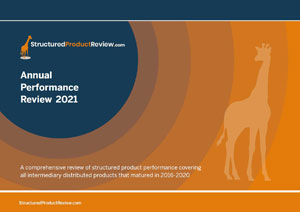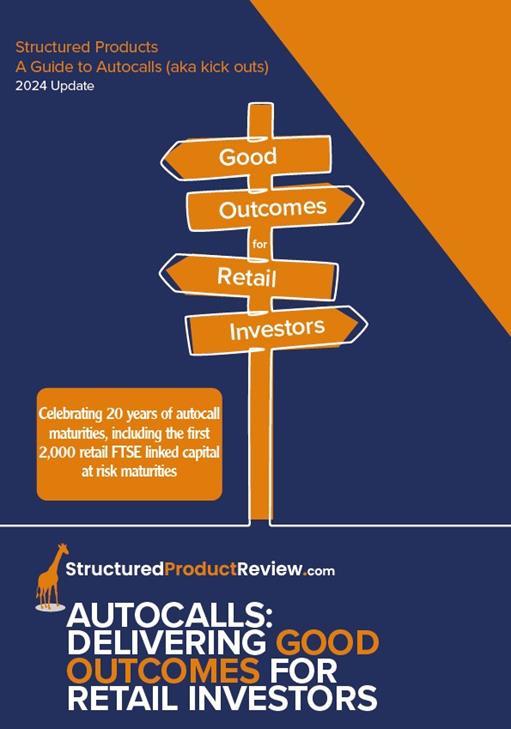Max Darer, 28/08/2024
Reflecting on the thirteen FTSE linked capital at risk autocalls that were faced with their final observation date in 2024 and last chance saloon for maturing with positive returns, Monday saw the last two such plans mature with a full six years of snowballed coupons.
Returns of 43.5% - 61.5% were rewarded to investors at the end of the six-year terms. Whilst it is rare to see FTSE 100 only autocalls run for their entire maximum term, investors in these plans were rewarded with the maximum possible gain as defined by the product terms. Looking at average strike levels for the thirteen plans and the average final index levels, the FTSE rose by approximately 7.7% over the six years. Whilst earlier in the year a positive maturity was by no means certain the final result of 5.5 to 8 times return on the performance of the underlying market investors will no doubt be happy with their investment decision made over half a decade ago. For reference the FTSE 100 total return index which includes dividends paid by the constituent companies returned c. 36% since 2018 – demonstrating again the strength of structured products, especially in range bound markets.
The chart below shows the FTSE 100 over the term of these thirteen plans, that marginally missed out on their penultimate observation but triggered a positive maturity on their final chance thanks to the rise in the FTSE this year. We can also see that the capital protection barriers were far from being touched, even at levels seen in the darkest days of the pandemic.
Source: StructuredProductReview.com
Almost 2050 capital at risk FTSE* linked autocalls have matured since the first was issued 21 years ago with only 13 failing to produce a gain and simply returning the invested capital.
*FTSE incorporates plans linked soley to the FTSE 100 or its very close, 99%+ correlated 'cousin' the FTSE CSDI, which tracks the same 100 stocks with the same weightings but accounts for dividends differently.
Structured investments put capital at risk.
Past performance is not indicative of future results.
Also in this section
- How old is too old? Are structured products to die for?
- Product focus - October 2024
- Q3 2024 Issuance
- Q3 2024 maturity results
- A share of spread bets on steroids?
- Product focus - September 2024
- Maturities of the month - August 2024
- Right on time
- Product focus - August 2024
- Keep calm and zoom out
- 2,000 and counting
- Q2 2024 maturity results
- 20 years of autocall maturities
- Product focus - June 2024
- Fixed income or interest?
- Maturities of the month - May 2024
- The barrier debate - revisited
- Product focus - April 2024
- Maturities of the month - April 2024
- Time to call
- I don't believe markets are ever too high for Structured products!
- Notes on counterparty exposure
- Return of Nikkei
- Q1 2024 issuance
- Q1 2024 maturity results
- Structured Products – AAAAAGH!
- Hop in CIBC
- Re-enter Santander
- How to build a financial fortune - revisited
- Issuance in 2023
- Where's the risk?
- Questionable offerings
- Challenging the case against structured products - 'Loss of dividends'
- Navigating the investment landscape
- Challenging the case against structured products - Counterparty risk
- 6-year autocalls approaching final destination
- 1,750 FTSE capital at risk autocall maturities
- The leopard that changed her spots
- Q3 2023
- Challenging the case against structured products - Keydata
- Dilemmas for UK IFA's and the unique role of Structured Products
- 'High charges'
- Precipice bonds
- Intro
- FTSE 100 Contingent Income
- Indexing the indices
- Something different
- Investing through volatility
- 100 10:10s
- The best or worst?
- The 10%/25% 'Rule' that never was
- Structured products and the yield curve
- Fixed income: Capital at risk?
- Prospects for UK inflation - and fun with A.I!
- The Barrier Debate
- More Deposits for now
- Last of the Americans
- What if?
- Time heals all wounds, we hope...
- How to diversify portfolios using structured products?
- The Proof Is In The Pudding...
- Debunking Structured Misconceptions
- 1,500 FTSE Capital-at-Risk Autocall Maturities
- Q3 2022 Maturity Results
- What do we prefer?
- Deposits vs Capital ‘Protected’
- There’s time yet…
- Where did you invest your clients?
- A Six-Month Reflection
- Return of the Rev Con
- Happy 2nd Birthday FTSE CSDI
- Q2 2022 Maturity Results
- The best and worst yet still the best
- Critique my Suitability - Mariana 10:10 Plan June 2022 (Option 2)
- 10/10 for 55 10:10’s
- Q1 2022 Maturity Results
- 'How to build a financial fortune': a follow up
- Critique my Suitability - Mariana 10:10 Plan April 2022 (Option 2)
- 2021 Capital-at-Risk Autocall Maturity Review
- An unwelcome return...
- CSDI's First Birthday
- Bon Anniversaire
- Introducing the FTSE Custom 100 Synthetic 3.5% Fixed Dividend Index
- Q3 2021 Maturity Results
- Critique my Suitability - Mariana 10:10 Plan October 2021 (Option 2)
- Blurring the lines...
- Beware of false knowledge; it is more dangerous than ignorance
- Good news, bad news...
- Certainty is Certainly a Benefit
- Critique my Suitability - Mariana 10:10 Plan September 2021 (Option 2)
- A Twenty-Year Progression
- Q2 2021 Maturity Results
- Nine 8:8s Post Positive Returns in Falling Markets
- Critique my Suitability
- Q1 2021 Maturity Results
- Morgan Stanley’s Marvelous Maturity Medley
Current Products
We review the UK's retail structured investment sector, providing pertinent support for Professional Advisers and relevant research tools.
View all ⟶


